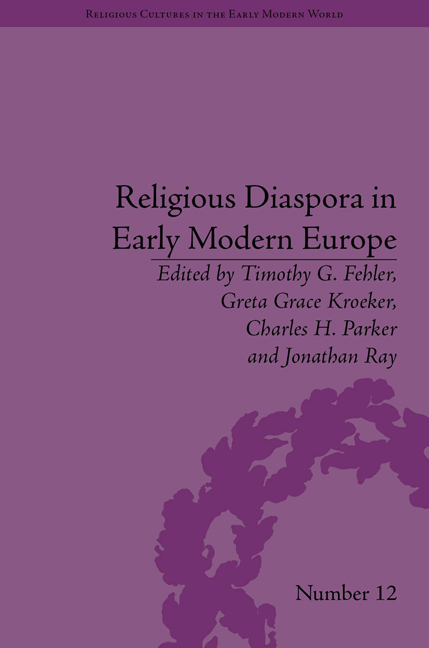Book contents
- Frontmatter
- CONTENTS
- Acknowledgements
- List of Contributors
- List of Figures
- Introduction
- Part I Tactics for Inclusion
- Part II Programmes of Restoration
- 4 Exile, Education and Eschatology in the Works of Jan Amos Comenius and John Milton
- 5 Missionaries as Exiles: Calvinist Strategies for Restoration in Communities under the Dutch East India Company
- 6 Niccolò Guidalotto da Mondavio and his City View of Constantinople (1662): The Experience of an Exile
- 7 Educating for Martyrdom: British Exiles in the English College at Valladolid
- Part III Methods of Coping
- Notes
- Index
7 - Educating for Martyrdom: British Exiles in the English College at Valladolid
from Part II - Programmes of Restoration
- Frontmatter
- CONTENTS
- Acknowledgements
- List of Contributors
- List of Figures
- Introduction
- Part I Tactics for Inclusion
- Part II Programmes of Restoration
- 4 Exile, Education and Eschatology in the Works of Jan Amos Comenius and John Milton
- 5 Missionaries as Exiles: Calvinist Strategies for Restoration in Communities under the Dutch East India Company
- 6 Niccolò Guidalotto da Mondavio and his City View of Constantinople (1662): The Experience of an Exile
- 7 Educating for Martyrdom: British Exiles in the English College at Valladolid
- Part III Methods of Coping
- Notes
- Index
Summary
The foundation of the first English Catholic seminary in Spain after the Armada defeat could be seen as a retreat from the ‘frontline’ that the colleges in Flanders and France offered, but for its founder, Robert Persons, it was a strategic step to consolidate the strength of the mission to re-convert England. Spain, the European bastion of Catholic faith, was the obvious choice to establish a solid base of operations, considering that Philip II, who was providing important economic support for the mission, would have the opportunity to supervise how his money was being used and what sort of education the students were receiving. Following the foundation of St Alban's College in Valladolid in 1589, its immediate success led to new seminaries in Seville (1592), Madrid (1610) and Lisbon (1622). These institutions have received comparatively little attention from scholars of early modern English Catholicism, who have mainly focused on the English colleges of Douai and Rome. This scholarly neglect is due to a variety of reasons, among them the fact that Douai and Rome were constituted earlier and their sources are more easily accessible; but the project of a future Catholic England was also embraced by the exiles who came to Spain to train as missionary priests and return to their homeland as ‘soldiers of the faith’.
- Type
- Chapter
- Information
- Religious Diaspora in Early Modern EuropeStrategies of Exile, pp. 93 - 106Publisher: Pickering & ChattoFirst published in: 2014



